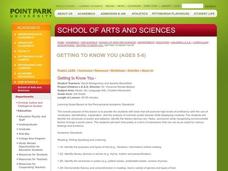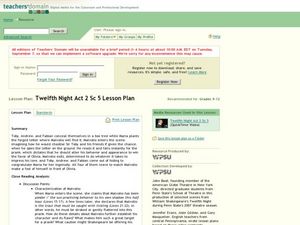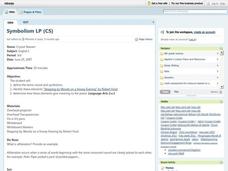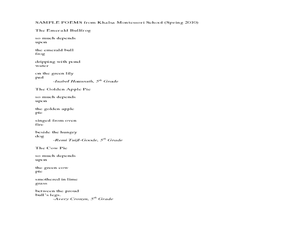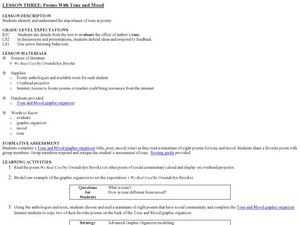Curated OER
Getting to Know You
Third graders explore different types of poetry and illustrate their own experiences through creating their own poem. In this getting to know you lesson, 3rd graders create and recite their poems with a self-portrait.
Curated OER
Oliver/Kenyon
Students, through two pieces of writing, identify poetic/language devices through the speakers, personification , imagery, metaphor, etc. They assess the patterns those devices are used in and analyze the theme of each. Each student...
Curated OER
Resistance Poetry
Young scholars create a definition for the term resistance. Once a definition has been created, they create a visual image to correlate with their definition. Working in groups, students read several different resistance poems and...
Curated OER
A Courtin' We Will Go
Students investigate dialect in poetry as an indication of a people's culture in literature. They write a poem about dating in this era.
Curated OER
Poetic Devices
In this figurative language worksheet, learners read and study examples of simile and metaphor. There are 20 questions to be used with Smartboard and 10 questions in which students identify similes or metaphors.
Maryland Department of Education
A Raisin in the Sun and Dreams Deferred
To conclude a study of A Raisin in the Sun and to prepare for a visit to the Lewis Museum, class members analyze Langston Hughes' poem "Harlem." Learners then draw connections to characters in the play and to their own experiences...
National Endowment for the Humanities
García Márquez’s Nobel Prize Speech: “The Solitude of Latin America”
To conclude a study of One Hundred Years of Solitude, class members analyze Gabriel Garcia Marquez's Nobel Prize in Literature acceptance speech. After a whole-class discussion of the main ideas in the speech, individuals draft a...
National Endowment for the Humanities
Language Analysis Based on Stave 1
Class members meet the original scrooge, the Dickens character whose name has become synonymous with a cold-hearted, tight-fisted, miser. Using the provided worksheet, readers closely examine context clues to determine the meanings of...
Curated OER
Learning Life Lessons through Fables
Explore a variety of fables to learn life's lessons through engaging stories. Add rigor to the learning process with activities that include matching a a fable to the story's moral, short answer exit slips, and a three-column graphic...
Prestwick House
"Because I could not stop for Death" -- Visualizing Meaning and Tone
Emily Dickinson's "Because I could not stop for Death" provides high schoolers with an opportunity to practice their critical thinking skills. They examine the images, diction, rhythm, and rhyme scheme the poet uses and consider how...
Curated OER
Elements of Satire
Students analyze satirical articles. In this elements of satire lesson plan, students read and analyze satirical articles from newspapers. They create Venn diagrams to compare and contrast articles. Students use...
Curated OER
Twelfth Night Act 2 Scene 2
Students read and discuss act 2, scene 2 of Shakespeare's, Twelfth Night. In this Shakespeare lesson, students read and discuss this scene line by line while investigating the themes of gender roles and levels of love. They also discuss...
Curated OER
Twelfth Night Act 2 Scene 5 Lesson Plan
Students read and complete activities for the Shakespeare play Twelfth Night. In this play analysis lesson, students discuss the themes, characters, and literary devices used in Act 2, Scene 5 of the Twelfth Night. Students complete a...
Curated OER
Poetry
What is the difference between a simile and a metaphor? Third graders read a poem as a class and chart all of the similes and metaphors they hear. They then discuss the differences between each literary device as well as what is being...
Curated OER
Philadelphia Museum of Art
Students study paintings and use their knowledge of story elements to analyze the art. In this art analysis lesson plan, students review a novel for its elements. Students study the image At the Moulin Rouge: The Dance and discuss the...
Curated OER
Metaphors in Literature
Eighth graders analyze literature and the use of metaphors. In this metaphors activity, 8th graders view and discuss the examples of metaphors. Students complete the phrases by writing in a metaphor.
Curated OER
Classic Short Stories by Kate Chopin
Students read two classic short stories by Kate Chopin and write a comparison of the stories. For this short story comparison lesson, students read 'Desiree's Baby' and 'The Story of an Hour' and analyze the foreshadowing and irony....
Curated OER
Imagery
Students read the poem The Worker by Richard W. Thomas as an example of the effective use of imagery. Then they complete a 5-senses chart describing some part of nature, e.g. sea, clouds, etc. Then they write their own poem using the...
Curated OER
Symbolism Lesson Plan
Students define the terms symbolism and mood. In groups, they read a poem by Robert Frost and identify the concepts in the poem. As a class, they discuss how the two elements give a meaning to the writing. They also give their own...
Curated OER
Figurative Language 2
Students read nursery rhymes and advertisements to identify examples of figurative language. As a class, students discuss the use of figurative language and its effectiveness in advertising, children's books, rhymes, poetry, etc. ...
Curated OER
Gift of the Magi LP2
Ninth graders read the story, "The Gift of the Magi" and identify examples of allusion and situational irony. They define and give examples of situational irony. Students plot sequence, structure, define allusion and give examples.
Curated OER
Meanings of everyday words and symbols
Students find the meanings of everyday words and symbols. In this symbol instructional activity, students are broken up into 3 groups: below, at and above grade level. They use cereal boxes, pizza boxes, and granola bar boxes in order to...
Curated OER
The Red Wheelbarrow
Students explore an imagist poem. In this poetry lesson students write a poem in the imagist's style using "The Red Wheelbarrow" by William Carlos Williams as an example. The poems are read aloud and discussed.
Curated OER
Poems with Tone and Mood
Students examine the use of tone in poetry. In this literature lesson, students read "We Real Cool," by Gwendolyn Brooks and use the provided graphic organizer to chart the poem's tone and mood.
